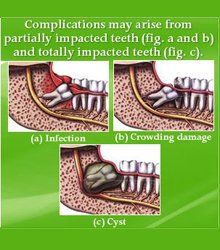Learn more about wisdom teeth
Wisdom teeth, or third molars, are the last teeth to develop and appear in the mouth behind the upper and lower second, or 12-year molars.
They are called "wisdom teeth" because they usually appear during a person's late teens or early twenties, which has been called the "age of wisdom." Anthropologists note that the rough diet of early humans resulted in the excessive wear of their teeth. Normal drifting of the teeth to compensate for this wear ensured that space was available for most wisdom teeth to erupt by adolescence.
The modern diet, which is much softer, helps set the stage for problems when the final four molars enter the mouth. Today, wisdom teeth cause more problems than any other teeth.

Impacted wisdom teeth
When a wisdom tooth is blocked from erupting or coming into the mouth normally, it is termed "impacted." A tooth may only be partially impacted, meaning it grows in crooked and breaks through the gum only partially, or it may be totally impacted.
Nine out of ten people have at least one totally impacted wisdom tooth resulting from a lack of space in the mouth. Partially impacted teeth can lead to problems such as pain, infection, and crowding of, or damage to, adjacent teeth. In the case of totally impacted teeth, more serious problems can occur if the sac that surrounds the impacted tooth fills with fluid and enlarges to form a cyst. This enlargement can hollow out the jaw and result in permanent damage to the adjacent teeth, jawbone, and nerves.
In rare cases, if the cyst is not treated, a tumor may develop from the walls of the cyst and a more involved surgical procedure may be required to remove it. Many problems with wisdom teeth can occur with few or no symptoms, so there can be damage even without you knowing it.
A recent study sponsored by the American Association of Oral and Maxillofacial Surgeons and the Oral and Maxillofacial Surgery Foundation finds that wisdom teeth which have broken through the tissue and erupted into the mouth in a normal, upright position may be as prone to disease as those wisdom teeth that remain impacted.
Wisdom teeth are easier to remove when the patient is younger, since their roots are not completely formed, the surrounding bone is softer, and there is less chance of damaging nearby nerves or other structures. Removal of wisdom teeth at a later age becomes more complicated as the roots have fully developed (may involve the nerve) and the jawbone is denser.

Schedule an appointment
Hours:
- Monday
- Closed
- Tue - Thu
- -
- Friday
- -
- Sat - Sun
- Closed
Closed 12:30 PM - 2:00 PM for lunch
Ronald P. Martin, D.M.D., P.C.
125 Eagle's Pointe Pkwy, Ste. 100
Stockbridge, GA 30281
Most types of insurance are accepted. Contact our office for participating plan and pricing information.
Hours:
- Monday
- Closed
- Tue - Thu
- -
- Friday
- -
- Sat - Sun
- Closed
Closed 12:30 PM - 2:00 PM for lunch
Memberships:
- Georgia Dental Association™
- American Dental Association™
- American Board of Oral and Maxillofacial Surgery™
- Georgia Society of Oral and Maxillofacial Surgeons™
Awards:
- D.M.D. Degree from Medical College of Georgia
- Board Certification from the American Board of Oral and Maxillofacial Surgery

